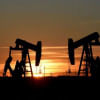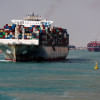Oil soars as Hamas attack on Israel sparks war

World oil prices spiked Monday after Hamas launched a shock deadly attack on Israel, which has declared war on Gaza, sparking fear of an escalating conflict in the crude-rich Middle East.
Benchmark oil contracts Brent and WTI soared more than five percent in earlier Asian deals before easing back somewhat.
The worsening crisis sent shockwaves through global equity markets, although energy companies were boosted by higher oil prices which lift their profits and revenues.
The dollar, yen and Swiss franc, as well as gold, won strong support as they benefited from their status as a haven investment in times of heightened geopolitical turmoil.
The crisis has fanned concerns about crucial supplies at a time when supply worries are already high owing to Saudi Arabia and Russia's output cuts.
It has also renewed fears about the impact on inflation, with energy costs a key driver of spiking prices, giving a fresh headache to central banks as they try to ease up on interest rate hikes to avoid recessions.
The surprise attack and Israel's declaration of war in response to it have left more than 1,100 dead and raised concerns that a potential broadening of the conflict could draw in the United States and Iran.
Israeli Defence Minister Yoav Gallant on Monday ordered a "complete siege" on the Gaza Strip as the military pounded the Palestinian territory with air strikes.
The Kremlin warned there was a "high risk" of a third party entering the war, after Washington pledged "rock solid" support for Israel and said it was moving warships closer.
The Bank of Israel launched the sale of up to $30 billion in foreign currency reserves, as it sought to curb volatility in its shekel currency.
However, the shekel has since tumbled to a seven-year low against the dollar.
"The shocking attacks in Israel have sent the price of oil soaring, as investors assess the potential for the conflict to disrupt supply in the Middle East, if other countries are drawn in," said Susannah Streeter, head of money and markets at Hargreaves Lansdown.
"With the Israeli government warning of a long and difficult war, there are concerns that deep and incessant retaliative strikes on Gaza could potentially bring Iran into the conflict and have an impact on the flow of energy in the region."
A decidedly risk-off mood also saw investors push into the safety of the dollar, which was up against the pound and euro, as well as the Australian and New Zealand dollars.
The yen, considered one of the safest currencies, strengthened against the greenback, though it still remains locked around 11-month lows.
Gold meanwhile gained around one percent in value.
Asian stock markets were mixed, with Shanghai dropping on its first day back after a week-long holiday as investors continue to fret over the stuttering Chinese economy.
In Europe, London equities climbed with strong gains for oil giants BP and Shell, while Paris and Frankfurt slid.
Wall Street had rallied Friday on data showing a forecast-busting jump in new jobs but a slowdown in wage growth.

 For all latest news, follow The Daily Star's Google News channel.
For all latest news, follow The Daily Star's Google News channel. 








Comments